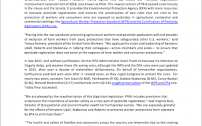Leading farmworker organizations and advocates for farmworkers in the United States and Mexico today are submitting a petition under the NAFTA labor side agreement challenging the failure of the United States government to comply with its obligations to protect international migrant workers who are hired under the H-2A agricultural guestworker program.
The petition was submitted to the National Administrative Office in Mexico City for the North American Agreement on Labor Cooperation (NAALC), requesting action by the North American Commission on Labor Cooperation (“Commission”), which the U.S., Mexico and Canada established.
The petition was submitted by Farmworker Justice; the United Farm Workers (UFW); the Farm Labor Organizing Committee, AFL-CIO (FLOC); and Pineros y Campesinos Unidos del Noroeste (PCUN, Oregon’s farmworker union), which are based in the United States, and Proyecto de Derechos Económicos, Sociales y Culturales, A.C (ProDESC), which is based in Mexico.
Principle 11 of the NAALC, on Protection of Migrant Workers, states the parties’ goal of providing migrant workers in one nation’s territory with the same labor law protection that apply to its own nationals. The Agreement also imposes enforceable obligations on the three nations to provide high labor standards; effective, impartial tribunals; effective remedies to achieve compliance with labor laws; and effective action by each government to enforce workers’ rights.
The principal federal employment law for farmworkers in the United States excludes H-2A agricultural workers from its protections and remedies. That law is the Migrant and Seasonal Agricultural Worker Protection Act of 1983 (referred to as “AWPA” or “MSPA”). It was passed to address persistent problems faced by farmworkers and strengthened an earlier law.
The petitioners seek to reduce abuses in the H-2A program, which recently has been expanding rapidly, to over 200,000 agricultural guestworkers in 2017, mostly from Mexico. Abuses in the H-2A program have been reported by many sources over many years, including in the Farmworker Justice report, “No Way to Treat a Guest,” and a series of articles in Buzzfeed.
The AWPA establishes obligations on farm operators and other agricultural businesses, including farm labor contractors. The AWPA contains significant protections regarding recruitment, hiring, employment, payment of wages, transportation, and housing of migrant farmworkers. Importantly, the AWPA authorizes victimized workers to file a lawsuit in U.S. federal courts to enforce its protections. It creates several remedies to compensate workers, stop ongoing violations, and deter future violations, including monetary damages, special “statutory damages” and injunctive relief.
The exclusion of H-2A visa workers from the AWPA deprives them of labor protections, remedies, and access to federal courts, all of which have been deemed important and effective to protect migrant workers in the United States. Although the law and regulations of the H-2A program require certain protections for U.S. and foreign workers at H-2A program employers, the AWPA provides different and additional protections and remedies for U.S. migrant workers. H-2A guestworkers seeking to enforce their employment contracts are relegated to state courts and often to inferior remedies under state contract laws.
H-2A guestworkers, arguably among the migrant workers most in need of protection due to their vulnerability, should not be excluded from AWPA’s protections and remedies.
The petition, formally known as a “public communication,” requests commencement of proceedings under the Labor Side Agreement, formally known as the North American Agreement on Labor Cooperation (NAALC), to address the violations of the NAALC and obtain all appropriate remedies. The petition seeks agreement among the U.S., Mexico and Canada, that the protections and remedies in the Migrant and Seasonal Agricultural Worker Protection Act, or their equivalent, will be extended to migrant workers employed in the United States under the H-2A temporary foreign agricultural worker program.
Contact information:
Bruce Goldstein
President, Farmworker Justice
Washington, D.C. 20036
202-800-2521
bgoldstein@farmworkerjustice.org
www.farmworkerjustice.org
Leydy Rangel
Communications Specialist
United Farm Workers Foundation
California
lrangel@ufwfoundation.org / (760) 899-4604
(bilingual)
Elena Villafuerte
Responsable del Programa de Análisis e Incidencia
Proyecto de Derechos Económicos, Sociales y Culturales (ProDESC)
(5255) 52122229/ 52122230- 758608840/ 75860885
elena.villafuerte@prodesc.org.mx
Calle Zamora 169-A Condesa, México D.F.
Facebook /ProDESC.AC
Twitter: @ProDESC
www.prodesc.org.mx
(bilingual)
Read moreLeading Farmworker Organizations and Advocates in the U.S. and Mexico File Challenge under NAFTA Labor Side Agreement for U.S. Government Denial of Equal Rights to H-2A Agricultural Guestworkers

